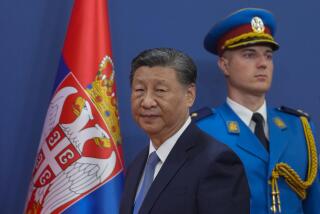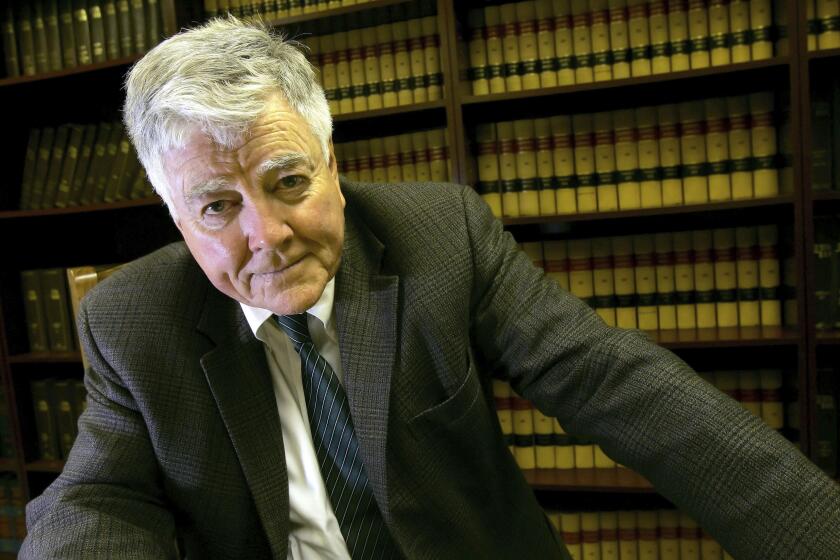Radio Kandahar Is Back on the Air
When moujahedeen forces raced into Kandahar 11 days ago to take over from the retreating Taliban, Abdul Ali was on a personal mission.
He rushed to the radio and television center where he used to work and declared to the few remaining employees that he was taking charge. At his behest, the staff quickly dug out some dusty hidden music tapes that the Taliban had overlooked in its drive to stamp out recorded music.
Ali entered the station that day around noon. At 3 p.m. he turned the switch and the patriotic anthem “Oh My Country” became the first song to be broadcast in seven years. “It was a happy moment,” he recalled.
With a reach of almost 100 miles in every direction, approximately 100 tapes in its library and a news staff too poor to afford tape recorders, Radio Kandahar is back on the air. It daily offers 2 1/2 hours of news, information, patriotic tunes and Afghan folk songs, played on 30-year-old reel-to-reel tape decks.
“Please, can you ask someone in the West to give us money to buy new equipment,” Ali pleaded, as an ugly hiss came through the background of a tinny song being played Monday night.
The Taliban who ruled in Kandahar from 1994 destroyed music, which it considered a distraction from Islam and the work of the devil. Tapes were either burned or unwound and festooned on lampposts. So much tape was destroyed that it can still be seen blowing in the city gutters.
It operated its version of Radio Kandahar too. But under the Taliban, the only music was religious chants without instruments. The rest was news, propaganda and Islamic sermons. In sum, said Ali, “No one was listening.”
Ali, 45, a lifelong Kandahar resident, has only a ninth-grade education. But his repute as a commander fighting the Russians earned him the job of running the radio and television center in Kandahar for the two years before the Taliban arrived. Soon after that, he left.
“I would not work for them, ever,” he said. “I knew from the very beginning that they were not our people and they were not our friends. They would never be loyal to this soil.”
Before the Taliban came in, when Afghanistan was riven by factional fighting, Ali had been among the commanders who favored a loya jirga--or grand council--to form a unified national government under the former king, Mohammad Zaher Shah. After the Taliban took over, he kept up contacts with like-minded Afghans inside the country and abroad, while working for a foreign nongovernmental development organization.
Because of such links, Ali was considered suspect by the Taliban. And 1 1/2 months ago, shortly after the anti-Taliban fighter Abdul Haq was hunted down and killed when he tried to start an insurrection near Jalalabad, Ali was held for five days for suspected disloyalty.
When released, he was warned not to try to leave Kandahar. “If we catch you going, we will kill you immediately,” he said he was told.
But Ali was not deterred. When he heard that Pushtun leader Hamid Karzai had sneaked into Urozgan province and was organizing resistance to the Taliban, Ali went off to join up. In his weeks with Karzai’s forces, he got permission from the anti-Taliban commanders to revive the radio station as soon as Kandahar fell.
When the day finally came, and he had the chance to put on that first tape, Ali said he felt “very good and happy, because this was the dream of the people.”
Now, “the atmosphere has changed in a good way, because there used to be a ban on television, radio and music. You can see happy smiles everywhere. And you can see people listening to the radio.”
At present, the station broadcasts only from 8 p.m. until 10:30 p.m. Its information tends to be the pronouncements of the province’s new governor, Gul Agha Shirzai, and reports given to the station by the city’s new security chief or brought in by listeners.
One of Ali’s first acts has been to call back three women, including two announcers, who had not been allowed to work by the Taliban because of their gender. “We respect them, and we want to give them a chance to earn money for their families,” Ali said.
The station’s chief engineer, Kamal Uddin, 52, who has worked there for 29 years, smiled benignly as he watched a younger engineer, Mohammed Umar, thread a tape to set up a song for the Monday program. In a bare room next door, the program’s announcer, Abdul Jamil, worked on a script.
“I am very happy, of course,” said Uddin about the Taliban’s departure. “We like having an administration that respects professionals, including the doctor, the engineer or the businessman. The Taliban had no respect for [broadcasting] professionals. They only insulted us.”
But Uddin was dismayed when he looked into a battered armoire that contained the only tapes salvaged since the Taliban left. They filled a single shelf. “Before, there were more than 2,500,” he said.
Ali hopes that Kandahar residents will soon also be able to watch their city’s television station. But for now it is only a wish. The Taliban also considered television harmful to morals--so it destroyed all the cameras and had even burned the broadcast studio.
In a small way, his staff has taken its revenge, said Ali. On the official sign in the driveway, where the Taliban government had written “The Islamic Emirate of Afghanistan,” staff members have scratched out all but the word “Afghanistan.”
More to Read
Start your day right
Sign up for Essential California for news, features and recommendations from the L.A. Times and beyond in your inbox six days a week.
You may occasionally receive promotional content from the Los Angeles Times.






